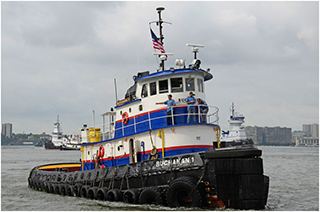The National Labor Relations Board (NLRB) has ruled that tugboat captains are not supervisors — its third decision this year favoring unions’ efforts to represent crews.
In the 2-1 order issued last week, the board said the employer didn’t show how captains are held accountable for crewmembers’ performance.
The case filed in 2010 involves Buchanan Marine, New Haven, Conn., and Local 333, United Marine Division, which is now part of the International Organization of Masters, Mates & Pilots (MM&P). The company wanted captains excluded from the bargaining unit, which the union has represented since 1990. An NLRB regional director denied its request, and the issue went to the board.
Just because it was determined that captains aren’t supervisors doesn’t mean “that their commands need not be obeyed by the crew,” or that the company can’t discipline the crew for disobeying them, board members Mark Gaston Pearce and Kent Hirozawa said. “It simply means that the captains may vote whether to be represented for purposes of collective bargaining, and be represented as part of a unit that selects a representative.”
In addition, the company’s Safety Management System (SMS) doesn’t say “the captain will suffer any specific adverse consequence to his employment if a mate or deckhand does not follow the required procedure,” Pearce and Hirozawa said.
Dissenting member Philip Miscimarra said his colleagues didn’t consider the “captains’ role as the officer in charge of everything that happens on board their vessels.”
“Tugboats do not operate themselves,” he said. Buchanan’s vessels run 24/7 with a captain, mate, engineer, deckhands and sometimes trainees in all kinds of weather under Coast Guard regulations assembling barges for tows. And he cites the case record that spells out captains’ duties.
What’s more, Miscimarra said, “the board has a long line of cases generally finding that tugboat captains are statutory supervisors, and courts have uniformly enforced such findings.” As for the accountability argument, “there is little question that the employer would remove a captain who lost his license due to a deckhand’s failure to follow Coast Guard regulations.”
MM&P “has long argued that the realities of today's maritime industry, in light of today's technology and micro-regulatory scheme, make obsolete ancient notions of licensed deck officers, including captains, as supervisors,” MM&P president Don Marcus said after the ruling. “We have made that argument successfully in our case against Brusco Tug & Barge before the NLRB, and we are gratified that the NLRB has continued to reject the notion that licensed deck officers are supervisors."
Buchanan Marine lawyer Craig Cohen, Weston, Conn., said Miscimarra filed a “very vigorous dissent,” and the other board members “ignored the criteria to get the results they want.”
“If the captain of a vessel under those circumstances is not a supervisor, then who is?” he said. The company ultimately can challenge the ruling in court, he said.
Earlier this year, the NLRB reaffirmed its decision that mates are not supervisors for union organizing purposes in a case involving Longview, Wash.-based Brusco and MM&P. Pearce and Hirozawa said the company “failed to meet its burden of establishing that the tugboat mates are statutory supervisors” based on the legal definition of their duties.
And in a 2-1 decision affecting Cook Inlet Tug & Barge, Anchorage, Alaska, and the Inlandboatmen’s Union of the Pacific, the board said captains are not supervisors under federal labor law based on their authority to assign and direct their tugboat crews. The union wants the captains included in a bargaining unit.




